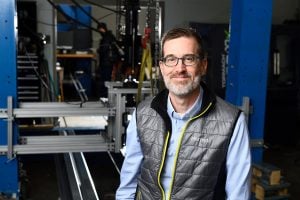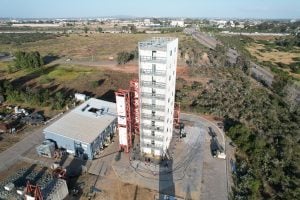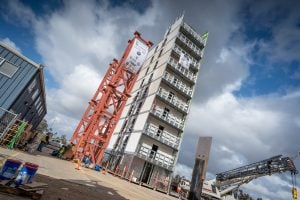Benjamin W. Schafer is the Willard and Lillian Hackerman Professor of Civil and Systems Engineering and the Director of the Ralph O’Connor Sustainable Energy Institute (ROSEI), at Johns Hopkins. Schafer’s professorial appointment is in the Department of Civil and Systems Engineering and he holds a secondary appointment in the Department of Materials Science and Engineering.
In addition to directing ROSEI, Schafer has served in a variety of leadership roles, including as associate director for the Academic Center for Reliability and Resilience in Offshore Wind, chair of the Department of Civil Engineering, chair of the Structural Stability Research Council, president of the Cold-Formed Steel Engineers Institute, director of the Cold-Formed Steel Research Consortium, and North American editor of the journal Thin-walled Structures.
Schafer’s research focuses on enabling engineers to reliably design resilient civil structures that use minimal material. Such structures require careful consideration of stability, and efforts in this area, largely for steel structures, is where his work has had significant impact. Schafer developed the Direct Strength Method of design, which is an internationally approved method for predicting the strength of cold-formed steel building components, led the first full-scale seismic tests on a cold-formed steel framed building, and has participated in the development of novel solutions for steel wind turbine towers. His research has received funding from a variety of federal agencies, industry associations, and companies.
Schafer is dedicated to translation of research to codes and standards that can be used by engineers to improve the reliability and efficiency of structures. He currently serves as chair of the American Society of Civil Engineers standards committee for stainless cold-formed steel members and as vice chair of the American Institute of Steel Construction standards committee for stainless structural steel members. In addition, he is a member of the standards committees for the American Iron and Steel Institute and the American Institute of Steel Construction, which collectively create a suite of standards that address all aspects of steel structures and are adopted by the nation’s building codes. Schafer also participates in translation as a Consulting Principal for the engineering firm Simpson, Gumpertz & Heger, Inc.
He has been awarded the SSRC 2026 Lynn S. Beedle Award, the Norman Medal, Shortridge Hardesty Award, Huber Research Prize, and Collingwood Prize from the American Society of Civil Engineers for his research and service in structural engineering. At Johns Hopkins, he has won the Robert B. Pond Sr. Excellence in Teaching and Dunn Family awards, which recognize outstanding teaching and mentoring. Schafer received his BSE in civil engineering from the University of Iowa in 1993 and MS and PhD degrees in structural engineering from Cornell University in 1994 and 1997, respectively.



